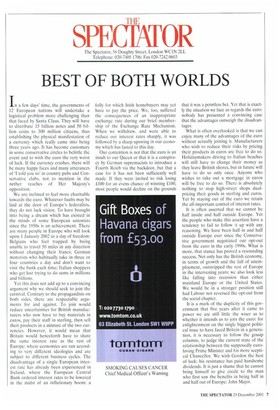BEST OF BOTH WORLDS
In a few days' time, the governments of 12 European nations will undertake a logistical problem more challenging than that faced by Santa Claus. They will have to distribute 15 billion notes and 50 billion coins to 300 million citizens, thus establishing the physical manifestation of a currency which really came into being three years ago. It has become customary in some conservative circles to belittle the event and to wish the euro the very worst of luck. If the currency crashes, there will be many happy faces and many utterances of 'I told you so' in country pubs and Conservative clubs, not to mention in the nether reaches of Her Majesty's opposition.
We are inclined to feel more charitable towards the euro. Whatever faults may be laid at the door of Europe's federalists, they do not lack vision. To have brought into being a dream which has existed in the minds of some European unionists since the 1950s is an achievement. There are many people in Europe who will look upon 1 January 2002 as a day of freedom: Belgians who feel trapped by being unable to travel 50 miles in any direction without changing their francs; German motorists who habitually take in three or four countries a day and don't want to visit the bank each time; Italian shoppers who get lost trying to do sums in millions and billions.
Yet this does not add up to a convincing argument why we should seek to join the carnival. Contrary to the propagandists on both sides, there are respectable arguments for and against. To join would reduce uncertainties for British manufacturers who now have to buy materials in euros, pay their staff in sterling, then sell their products in a mixture of the two currencies. However, it would mean that Britain would henceforth have to share the same interest rate as the rest of Europe: where economies are run according to very different ideologies and are subject to different business cycles. The disadvantage of a single European interest rate has already been experienced in Ireland, where the European Central Bank ordered interest rates to be lowered in the midst of an inflationary boom: a folly for which Irish homebuyers may yet have to pay the price. We, too, suffered the consequences of an inappropriate exchange rate during our brief membership of the Exchange Rate Mechanism. When we withdrew, and were able to reduce our interest rates sharply, it was followed by a sharp upswing in our economy which has lasted to this day.
Our contention is not that the euro is an insult to our Queen or that it is a conspiracy by German supremacists to introduce a Fourth Reich via the backdoor, but that a case for it has not been sufficiently well made. If they were invited to risk losing £100 for an evens chance of winning £100, most people would decline on the grounds that it was a pointless bet. Yet that is exactly the situation we face as regards the euro: nobody has presented a convincing case that the advantages outweigh the disadvantages.
What is often overlooked is that we can enjoy many of the advantages of the euro without actually joining it. Manufacturers who wish to reduce their risks by pricing their products in euros are free to do so. Holidaymakers driving to Italian beaches will still have to change their money as they leave British shores, but in future will have to do so only once. Anyone who wishes to take out a mortgage in euros will be free to do so. There is absolutely nothing to stop high-street shops dualpricing their goods in sterling and euros. Yet by staying out of the euro we retain the all-important control of interest rates.
It is often asserted that we cannot be half inside and half outside Europe. Yet the people who make this assertion have a tendency to fail to follow it up with any reasoning. We have been half in and half outside Europe ever since the Conservative government negotiated our opt-out from the euro in the early 1990s. What is more, that stance has proved a resounding success. Not only has the British economy, in terms of growth and the fall of unemployment, outstripped the rest of Europe in the intervening years; we also look less like falling into recession than either mainland Europe or the United States. We would be in a stronger position still had Labour not reversed the opt-out from the social chapter.
It is a mark of the duplicity of this government that five years after it came to power we are still little the wiser as to whether it intends us to join the euro: for enlightenment on the single biggest political issue to have faced Britain in a generation, it is necessary to follow the gossip columns, to judge the current state of the relationship between the supposedly euroloving Prime Minister and his more sceptical Chancellor. We wish Gordon the best of luck: his resistance has paid handsome dividends. It is just a shame that he cannot bring himself to give credit to the man who first saw the benefits in being half in and half out of Europe: John Major.


























































 Previous page
Previous page